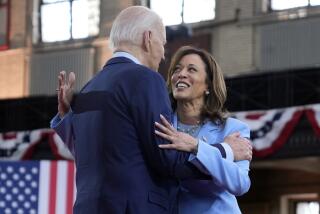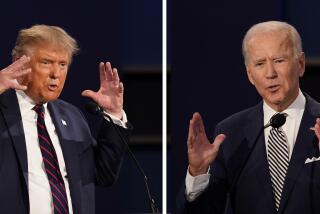The first test
A lot of ink has been spilled decrying Democratic vice presidential candidate Joe Biden’s comment that Barack Obama -- if elected -- will be tested in a foreign policy crisis early in his term. In fact, Biden was only being responsible and realistic. A newly elected President Obama would almost certainly be tested early on.
The first challenge, though, might not be a direct and obvious one, such as a Russian troop advance into Ukraine or an Iranian suicide-boat attack on a U.S. warship in the Persian Gulf. No, I fear the challenge would be oblique, even though it is already staring us in the face.
I refer to Iraq. The very issue that Obama wishes to put behind him in order to get on with other challenges, such as Afghanistan and climate change, has the power to drag him down -- and it will do so, if he becomes president, precisely because he wants it out of sight. Obama is not emotionally invested in Iraq; he was against the war, and he only grudgingly admitted the success of the “surge.” Biden, for his part, has fervently promised voters that he and Obama will “end this war.”
The problem is that both Iran and Al Qaeda -- like all of us -- have been listening to both men. And both the jihadists and the mullahs in Tehran are invested in not just an American withdrawal, but a humiliating one at that.
So what could happen? I fear a measurable uptick in violence in Iraq if Obama wins on Tuesday. The uptick will be significant enough to muddy the results of the surge, and the president-elect, rather than respond vigorously, will be tempted to say “I told you so” and thus win the Iraq debate with his Republican critics. The upturn in violence, he will be tempted to argue, only means we need to get out of Iraq even faster.
But that would be a mistake. It would quietly telegraph weakness to our adversaries around the world, even as it would be deniable as an overt crisis that the incoming administration needs to respond to. The last thing the incoming administration should want is to be seen as retreating in the face of adversity. That would embolden adversaries. And also, to retreat quickly in the face of rising casualties and human suffering in Iraq would be irresponsible.
I don’t mean to argue that we have to stay in Iraq to see the thing through, a la John McCain. I mean only to suggest that Obama and Biden, if elected, will -- on the morning of Nov. 5 -- immediately have to act like leaders rather than like candidates. And that means emphasizing what Obama mentioned only in passing in the second debate: that our withdrawal from Iraq must, of course, be responsible and as events permit. For as former Deputy Secretary of State Richard Armitage has said, we as a nation will be judged by the way we leave Iraq to the same degree that we were judged by how we entered it.
To succeed as president, Obama would have to keep Iraq off the front pages. Indeed, the more Iraq remains on the back pages in coming months, the better. He needs to delicately withdraw from Iraq and move forces into Afghanistan while keeping Iraq on a low burner and quelling gradually the fires in Afghanistan. He can’t do that by rushing for the exits. Yes, the Iraqi government, by virtue of the status of forces agreement it is negotiating with the United States, is committed to a quick American troop pullout. But that is the public display; behind the scenes, Iraqi defense officials are hoping for a slower, more careful withdrawal.
Getting out of Iraq is an art, not a science, and it would require Obama to move halfway to the McCain position the moment he is elected. In truth, slow is fast in Iraq.
Tough, albeit responsible, talk on Iraq the moment he is elected would buy the president-elect time. While his fervent desire to withdraw may be the correct approach, in the Hobbesian world of the Middle East, it transmits only vulnerability. The message that Obama needs to send now, from the Nile to the Euphrates, is, I’m not the guy you thought I was. I’m not Jimmy Carter or even Bill Clinton early in his first term, when he failed to intervene in Bosnia. I’m not the candidate who had a tepid response to the Russian invasion of Georgia.
Winning the domestic debate over Iraq has no relevance after Nov. 4, when it would instantly become Obama’s war. And however irresponsibly President Bush has performed in Iraq, he also dramatically improved our strategic position and reduced the violence there between 2007 and 2008. Obama’s goal, now that he seems likely to be elected, should be to consolidate Bush’s gains, not squander them. With that done, other successes in the wider region and throughout the world beckon.
More to Read
Get the L.A. Times Politics newsletter
Deeply reported insights into legislation, politics and policy from Sacramento, Washington and beyond. In your inbox three times per week.
You may occasionally receive promotional content from the Los Angeles Times.










